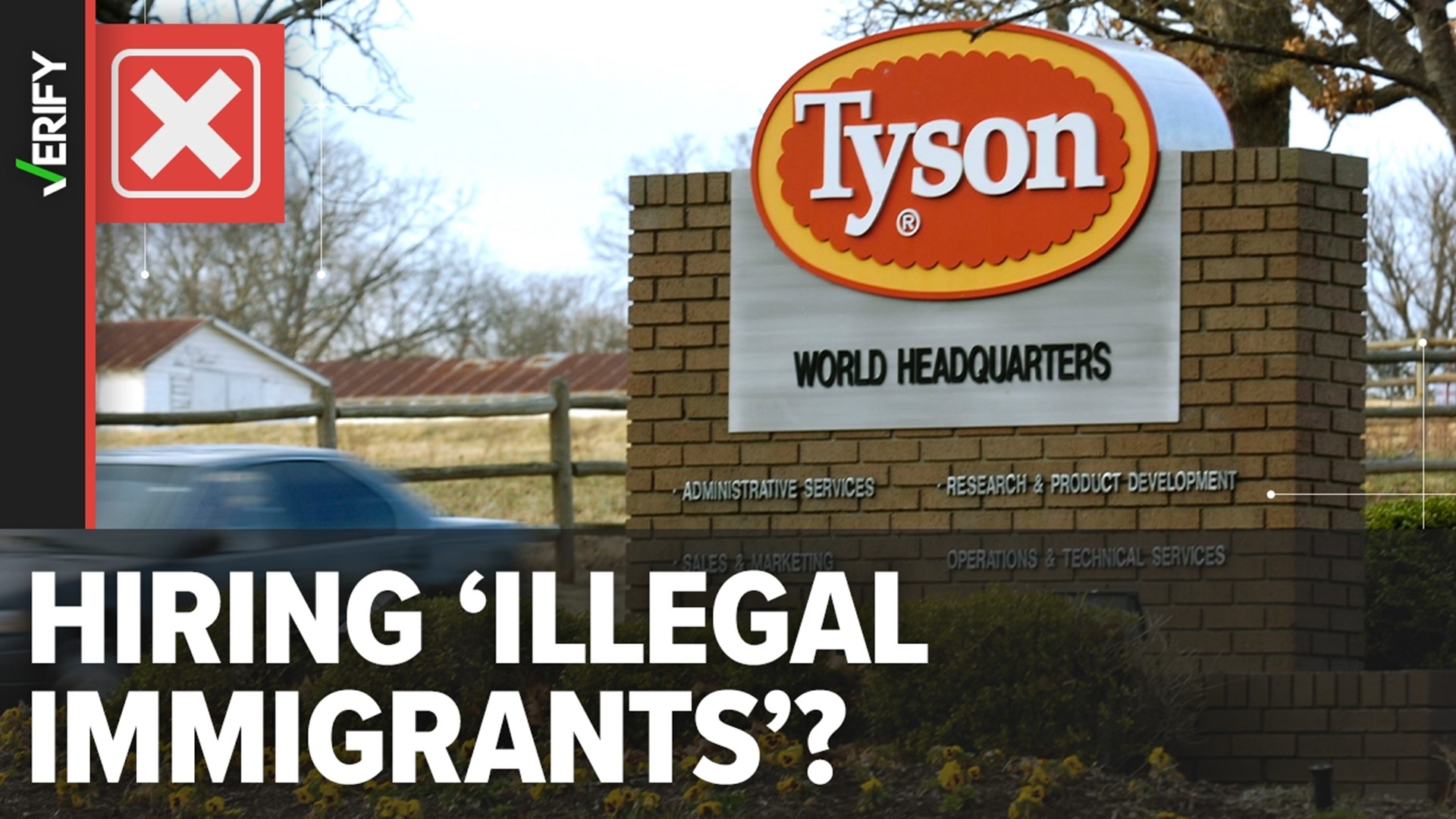Border security has become a political flashpoint as large numbers of migrants cross the southern border into the U.S. without prior authorization.
In recent days, viral social media posts have encouraged people to boycott Tyson Foods brands because of claims that the company is hiring thousands of “illegal immigrants” after laying off workers from one of its facilities in Iowa.
VERIFY reader George also texted the team to ask whether it’s true that Tyson is laying off American workers and replacing them with “illegal immigrants.”
THE QUESTION
Is Tyson Foods hiring “illegal immigrants” while laying off U.S. workers?
THE SOURCES
THE ANSWER
No, Tyson Foods is not hiring “illegal immigrants” while laying off U.S. workers. Tyson is closing a plant in Iowa, but company policy requires any employees hired elsewhere to be legally authorized to work in the U.S.
WHAT WE FOUND
Tyson Foods is not hiring “illegal immigrants” to work in its facilities while laying off U.S. workers, as posts claim. While the company has hired some people who are not U.S. citizens, they must be legally authorized to work in the U.S, according to company policy.
The company has also publicly condemned illegal immigration and partnered with the federal government to implement stricter screening processes to confirm employees’ work authorization status.
In a statement posted to its website, Tyson denied claims that it is cutting American jobs to hire immigrant workers, calling them “completely false.”
The company recently announced its plan to close a pork plant in the town of Perry, Iowa. But it “did not fire workers” from that plant to “replace them with refugees,” a spokesperson for Tyson told VERIFY.
“We closed our Perry, Iowa plant for specific business reasons,” the spokesperson said. “We recognize the impact on the local community and have encouraged all affected employees to seek another position within Tyson Foods. Our team offers support for those individuals who choose to relocate to a different plant, and there are more than enough open positions to accommodate those who wish to move elsewhere in the organization.”
It’s unclear exactly why the Iowa plant is closing, though a HyLife Foods pork plant in neighboring Minnesota said last year that it faced challenges from inflation, high grain costs, foreign exchange rates and the plant’s operational losses.
The decision to close the Iowa plant is unrelated to Tyson’s “hiring efforts at other facilities,” the company spokesperson added.
Tyson does hire certain noncitizens who are legally allowed to work in the U.S. These workers are not “illegal immigrants,” as the viral posts claim.
There are several groups of noncitizens who can legally work anywhere in the U.S. because of their immigration status, the Congressional Research Service (CRS) explains in a report. They include lawful permanent residents (LPRs), who are also known as “green card” holders, refugees and people who have been granted asylum.
In a statement posted to its website, Tyson Foods said it “employs about 120,000 team members in the United States, all of whom are required to be legally authorized to work in this country.”
The majority of Tyson’s U.S. workforce are American citizens, and the remainder are permanent residents or other people who can legally work in the U.S., a spokesperson for the company told VERIFY.
While the spokesperson did not provide a specific number of noncitizens who work for the company, Bloomberg reported on March 11 that Tyson employs about 42,000 immigrants in the U.S. Tyson did not confirm this number to VERIFY.
Tyson committed in 2022 to hiring 2,500 refugees over three years through its partnership with the nonprofit Tent Partnership for Refugees, according to the nonprofit’s website. It’s unclear how many refugees the company has hired since that time.
Under U.S. law, refugees are legally authorized to work as soon as they arrive in the country, U.S. Citizenship and Immigration Services (USCIS) explains on its website.
Tyson said in its online statement that it is "strongly opposed to illegal immigration” and “led the way in participating in two major government programs to help employers combat unlawful employment, E-Verify and the Mutual Agreement between Government and Employers (IMAGE) program.”
U.S. Immigration and Customs Enforcement (ICE) announced in January 2011 that Tyson Foods was “the first major food company to become a full member” of the voluntary IMAGE program, which is aimed at reducing unauthorized employment and the use of fraudulent identity documents.
Businesses that enroll in IMAGE are provided with trainings and guidance on topics such as fraudulent anti-discrimination, fraudulent documents, E-Verify, forced labor and child labor. All businesses looking to become IMAGE members are also subject to a Form I-9, or Employment Eligibility Verification Form, audit “without facing penalties or fines” for any errors found during the inspection, USCIS says.
The Associated Press contributed to this report.

